
I have registered to play in the PokerStars World Blogger Championship of Online Poker!
This Online Poker Tournament is a No Limit Texas Holdem event exclusive to Bloggers.
Registration code: 5494414

I have registered to play in the PokerStars World Blogger Championship of Online Poker!
This Online Poker Tournament is a No Limit Texas Holdem event exclusive to Bloggers.
Registration code: 5494414
 Plug's over, it's time to get down to business, and we'll do a mini live-blog to give you a feel for the action. This week's participants:
Plug's over, it's time to get down to business, and we'll do a mini live-blog to give you a feel for the action. This week's participants: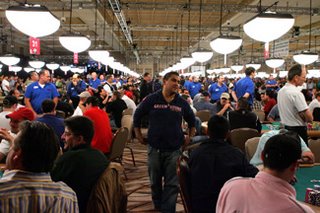 Pictured to the right is Carl Ygborn, then 25, of Sweden, as he made his exit in 561st place from last year's WSOP main event. As captured on ESPN's coverage and elsewhere, Ygborn was the official "bubble boy" of the event, presumably getting nothing for his deepest of all non-cashing runs while everyone ahead of him made the money. Of course, Harrah's soon announced that Ygborn would be receiving a free entry into this year's tournament as a consolation prize --- meaning that it was the 562nd-place finisher who really got the shaft.
Pictured to the right is Carl Ygborn, then 25, of Sweden, as he made his exit in 561st place from last year's WSOP main event. As captured on ESPN's coverage and elsewhere, Ygborn was the official "bubble boy" of the event, presumably getting nothing for his deepest of all non-cashing runs while everyone ahead of him made the money. Of course, Harrah's soon announced that Ygborn would be receiving a free entry into this year's tournament as a consolation prize --- meaning that it was the 562nd-place finisher who really got the shaft.
 And the promotional wheel spins. Note that I've conveniently overlooked the fact that in order to take full advantage of all the promotional gimmicks available to this year's WSOP entrants, one would need to wear about six shirts and make the logos of all appear at the same time. NASCAR, anyone?
And the promotional wheel spins. Note that I've conveniently overlooked the fact that in order to take full advantage of all the promotional gimmicks available to this year's WSOP entrants, one would need to wear about six shirts and make the logos of all appear at the same time. NASCAR, anyone?
My blog is worth $11,290.80.
How much is your blog worth?
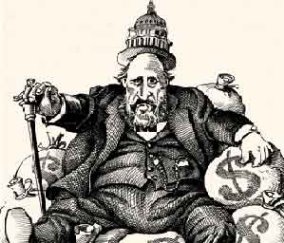
 I needed a good quote for this piece, so my first thought was to give a call to a Congressman I know, one Rep. James Nussle, a Republican from Iowa who's also now running for governor of that fine state. (That really is a Nussle photo to the right... with appropriate embelleshments.) There are some interesting issues regarding the differences in the approaches that state and federal legislative bides are pursuing as they seek to
I needed a good quote for this piece, so my first thought was to give a call to a Congressman I know, one Rep. James Nussle, a Republican from Iowa who's also now running for governor of that fine state. (That really is a Nussle photo to the right... with appropriate embelleshments.) There are some interesting issues regarding the differences in the approaches that state and federal legislative bides are pursuing as they seek to  The Register article is an exceptional example of lazy journalism, merely rehashing another section of the oft-quoted release from the American Gaming Association reporting on the house-sponsored survey conducted on the AGA's behalf by Peter D. Hart Research Associates. The very first sentence of the Register report tells you where this one is going: "Just 19 per cent of US internet gamblers realise – or are willing to admit – that the activity is currently illegal..."
The Register article is an exceptional example of lazy journalism, merely rehashing another section of the oft-quoted release from the American Gaming Association reporting on the house-sponsored survey conducted on the AGA's behalf by Peter D. Hart Research Associates. The very first sentence of the Register report tells you where this one is going: "Just 19 per cent of US internet gamblers realise – or are willing to admit – that the activity is currently illegal..."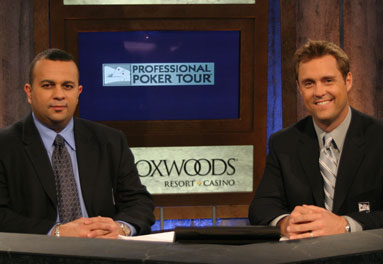
 This looks to be some fun-nee stuff in the making --- the WPT honchos haven't even named the requisite eye candy as of this report. Perhaps the new WPT hostess, Sabina Gadecki (right), was supposed to have this gig until Courtney Friel's sudden departure. (And a thank-you to dedicated reader "Anonymous" for indirectly pointing out that I had a Friel shot in there instead of a Gadecki one --- I grabbed the wrong photo. Oy and vey, one each.) And about the format of play, why, the press release couldn't be any clearer:
This looks to be some fun-nee stuff in the making --- the WPT honchos haven't even named the requisite eye candy as of this report. Perhaps the new WPT hostess, Sabina Gadecki (right), was supposed to have this gig until Courtney Friel's sudden departure. (And a thank-you to dedicated reader "Anonymous" for indirectly pointing out that I had a Friel shot in there instead of a Gadecki one --- I grabbed the wrong photo. Oy and vey, one each.) And about the format of play, why, the press release couldn't be any clearer:
 1) Who is this F-Secure? Are they some sort of fly-by-night operation trying to make a quick buck?
1) Who is this F-Secure? Are they some sort of fly-by-night operation trying to make a quick buck?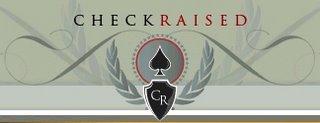 3) Checkraised.com's site says this: "The virus goes undetected by Norton AntiVirus and Microsoft Defender, even to this day. This is why we never noticed it until a 3rd party contacted us about the malicious software." Is this true?
3) Checkraised.com's site says this: "The virus goes undetected by Norton AntiVirus and Microsoft Defender, even to this day. This is why we never noticed it until a 3rd party contacted us about the malicious software." Is this true?

 Oh, wait, haven't I seen this routine in every lame informercial since the advent of cable TV? The ol' "disbeliever becomes the apostolic sycophant" curveball? Geez, even the Magic Bullet dreck does that one better.
Oh, wait, haven't I seen this routine in every lame informercial since the advent of cable TV? The ol' "disbeliever becomes the apostolic sycophant" curveball? Geez, even the Magic Bullet dreck does that one better.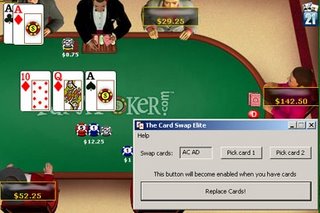
 But the frequency of these events right now and a recent fun time by me over in a like-structured in Poker.com's Blogger Poker Tour allows for the examination of this topic in an unusual way. When you're in an event where only one person moves on, then you play to win. But what's the right strategy when say, 30 people out of 1,000 entrants win the right to move on to the next step on the ladder?
But the frequency of these events right now and a recent fun time by me over in a like-structured in Poker.com's Blogger Poker Tour allows for the examination of this topic in an unusual way. When you're in an event where only one person moves on, then you play to win. But what's the right strategy when say, 30 people out of 1,000 entrants win the right to move on to the next step on the ladder? The release involved an announcement from StopPokerCheaters.com, proclaiming the availability of a freeware program designed not only to block trojans purportedly incorporated within some sites' poker-client packages, but to offer all kinds of anti-cheating functionality for use on a few of the largest sites. "100% Protection from online Poker Cheaters!" the site proclaims. It then goes on to tout the ability of this freeware package's software to help "expose poker teams," track "pro's [SIC] who win Large % of games," and of course, to install a special firewall to prevent the online site's software from doing things other than it's supposed to. The site also says that "we monitor [read: data-mine] all the top online poker rooms..."
The release involved an announcement from StopPokerCheaters.com, proclaiming the availability of a freeware program designed not only to block trojans purportedly incorporated within some sites' poker-client packages, but to offer all kinds of anti-cheating functionality for use on a few of the largest sites. "100% Protection from online Poker Cheaters!" the site proclaims. It then goes on to tout the ability of this freeware package's software to help "expose poker teams," track "pro's [SIC] who win Large % of games," and of course, to install a special firewall to prevent the online site's software from doing things other than it's supposed to. The site also says that "we monitor [read: data-mine] all the top online poker rooms..." There's even a demo on the site, showing how one can set up the software's firewall and supercede the controls of a site such as Party; the "Poker BodyGuard" logo here is screen-grabbed from that portion of the demo.
There's even a demo on the site, showing how one can set up the software's firewall and supercede the controls of a site such as Party; the "Poker BodyGuard" logo here is screen-grabbed from that portion of the demo.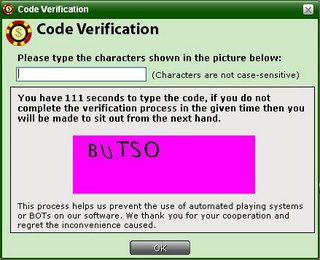 The pop-up pictured here features what is called "CAPTCHA" technology --- CAPTCHA being one of those things that we encounter every day but, for the most part, don't know what it's called. Go look it up at Wikipedia if you want to know what the acronym stands for. The image was first posted over on the 2+2 discussion forums, where such topics are often discussed. But, all the subsequent comments about going "Busto" aside, it's an interesting spotlight into the current state of bot-detection efforts.
The pop-up pictured here features what is called "CAPTCHA" technology --- CAPTCHA being one of those things that we encounter every day but, for the most part, don't know what it's called. Go look it up at Wikipedia if you want to know what the acronym stands for. The image was first posted over on the 2+2 discussion forums, where such topics are often discussed. But, all the subsequent comments about going "Busto" aside, it's an interesting spotlight into the current state of bot-detection efforts.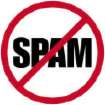 Here's a "Thank you, Captain Obvious!" --- just because your blogger's in a smarmy mood this evening. My collection of spams from the upstanding citizens at Cassava dates from (I believe) 2003, and is one of the reasons I quit playing at Pacific --- that and the crappy software and the ridiculous slow payouts --- those take five business days so they can sit on your money a little longer and grab a little bit more float-generated interest... courtesy of you.
Here's a "Thank you, Captain Obvious!" --- just because your blogger's in a smarmy mood this evening. My collection of spams from the upstanding citizens at Cassava dates from (I believe) 2003, and is one of the reasons I quit playing at Pacific --- that and the crappy software and the ridiculous slow payouts --- those take five business days so they can sit on your money a little longer and grab a little bit more float-generated interest... courtesy of you. BenefitPoker is part of the Excapsa Poker Network, which counts UltimateBet as its largest entity. A closer look suggests that BenefitPoker really is just UltimateBet in makeup and a new dress, but that's okay --- the purpose served by the new site is well worth duplicating the UB software onto another server, which is what seems to be have been done. UB is keeping its own face at a low profile, too, for which they deserve additional high marks. Especially in this time of legislative unrest --- a topic we'll return to in the very near future --- a site such as BenefitPoker is an idea whose time has definitely come. I'm a realist, after all; I say these things because they are true, not because they're necessarily pleasing to hear.
BenefitPoker is part of the Excapsa Poker Network, which counts UltimateBet as its largest entity. A closer look suggests that BenefitPoker really is just UltimateBet in makeup and a new dress, but that's okay --- the purpose served by the new site is well worth duplicating the UB software onto another server, which is what seems to be have been done. UB is keeping its own face at a low profile, too, for which they deserve additional high marks. Especially in this time of legislative unrest --- a topic we'll return to in the very near future --- a site such as BenefitPoker is an idea whose time has definitely come. I'm a realist, after all; I say these things because they are true, not because they're necessarily pleasing to hear.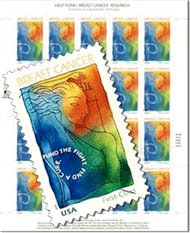 And unlike governments, BenefitPoker doesn't take out any fees, according to its web site. Everything paid in by participants goes either to the prize fund or the selected charity. In a tourney that ran earlier today, for instance, benefitting the American Stroke Association, the $25 dollar entry fee consisted of a $15 donation to the prize pool and a $10 donation to the ASA. Here are the other fine charities who have already benefitted from a BenefitPoker event:
And unlike governments, BenefitPoker doesn't take out any fees, according to its web site. Everything paid in by participants goes either to the prize fund or the selected charity. In a tourney that ran earlier today, for instance, benefitting the American Stroke Association, the $25 dollar entry fee consisted of a $15 donation to the prize pool and a $10 donation to the ASA. Here are the other fine charities who have already benefitted from a BenefitPoker event: By now everyone knows that Ted Forrest won the thing --- thereby explaining the wave of Forrest-covered magazines now plastered across the land --- but only in today's episode did we see how close Forrest came to not making his way into that high-test final matchup against Chris "Jesus" Ferguson. Remember that Forrest is not only good; he's very, very, very good, probably among the top ten players in the game.
By now everyone knows that Ted Forrest won the thing --- thereby explaining the wave of Forrest-covered magazines now plastered across the land --- but only in today's episode did we see how close Forrest came to not making his way into that high-test final matchup against Chris "Jesus" Ferguson. Remember that Forrest is not only good; he's very, very, very good, probably among the top ten players in the game.